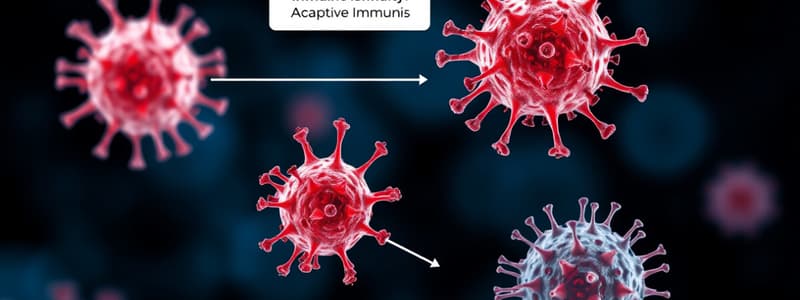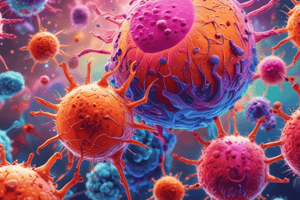Podcast
Questions and Answers
What distinguishes the immune response from the inflammatory response?
What distinguishes the immune response from the inflammatory response?
- The immune response is faster than the inflammatory response.
- The immune response primarily involves neutrophils, while the inflammatory response primarily involves lymphocytes.
- The immune response has memory, while the inflammatory response does not. (correct)
- The immune response is nonspecific, whereas the inflammatory response is specific.
Which of the following is a characteristic of the inflammatory response?
Which of the following is a characteristic of the inflammatory response?
- It can be induced by vaccinations.
- It involves lymphocytes and antibodies.
- It provides a quick reaction to infection. (correct)
- It has a memory component.
What type of antigens are distinguished by the Human Leukocyte Antigen (HLA)?
What type of antigens are distinguished by the Human Leukocyte Antigen (HLA)?
- Foreign chemical molecules.
- Self-antigens. (correct)
- Viral antigens.
- Environmental allergens.
What is the primary role of the bone marrow in the immune response?
What is the primary role of the bone marrow in the immune response?
Which cells are primarily involved in the adaptive immune response?
Which cells are primarily involved in the adaptive immune response?
In which phase do B and T cells become immunocompetent but still immature?
In which phase do B and T cells become immunocompetent but still immature?
What is the primary function of the immune system?
What is the primary function of the immune system?
What is primarily found in secondary lymphoid tissues?
What is primarily found in secondary lymphoid tissues?
What determines the receptor specificity of each clone of B or T cells?
What determines the receptor specificity of each clone of B or T cells?
What happens during the clonal selection phase?
What happens during the clonal selection phase?
What characterizes the secondary immune response compared to the primary response?
What characterizes the secondary immune response compared to the primary response?
What is the role of cytotoxic T cells (Tc) in the immune response?
What is the role of cytotoxic T cells (Tc) in the immune response?
What type of vaccine is the Tetanus toxoid classified as?
What type of vaccine is the Tetanus toxoid classified as?
Which type of T lymphocyte is primarily responsible for inducing a secondary immune response?
Which type of T lymphocyte is primarily responsible for inducing a secondary immune response?
What is the function of regulatory T cells (Treg)?
What is the function of regulatory T cells (Treg)?
Which type of vaccine is known for requiring less frequent boosters?
Which type of vaccine is known for requiring less frequent boosters?
What form of protection do synthetic vaccines primarily provide?
What form of protection do synthetic vaccines primarily provide?
Which statement is true about natural killer cells?
Which statement is true about natural killer cells?
What type of vaccine involves killing virulent microbes while retaining their immunogenicity?
What type of vaccine involves killing virulent microbes while retaining their immunogenicity?
Which vaccine type involves microbial polysaccharides coupled with proteins to enhance immune stimulation?
Which vaccine type involves microbial polysaccharides coupled with proteins to enhance immune stimulation?
What is the primary focus of most traditional vaccines?
What is the primary focus of most traditional vaccines?
What is the primary form of protection conferred by the HPV vaccine?
What is the primary form of protection conferred by the HPV vaccine?
What is the role of interleukin-2 (IL-2) in the immune response?
What is the role of interleukin-2 (IL-2) in the immune response?
Which of the following is NOT a type of T lymphocyte mentioned?
Which of the following is NOT a type of T lymphocyte mentioned?
Which type of vaccine is most suitable for individuals who are immunocompromised?
Which type of vaccine is most suitable for individuals who are immunocompromised?
Which type of vaccine utilizes recombinant proteins to form its antigens?
Which type of vaccine utilizes recombinant proteins to form its antigens?
Which cells are primarily responsible for producing antibodies during the humoral response?
Which cells are primarily responsible for producing antibodies during the humoral response?
Which of the following vaccines primarily elicits both an antibody and T cell response?
Which of the following vaccines primarily elicits both an antibody and T cell response?
What characterizes IgG antibodies in the immune response?
What characterizes IgG antibodies in the immune response?
What is the initial antibody type produced after an antigenic challenge?
What is the initial antibody type produced after an antigenic challenge?
What type of cells are formed as a result of clonal expansion?
What type of cells are formed as a result of clonal expansion?
How do antibodies neutralize pathogens?
How do antibodies neutralize pathogens?
What process do B lymphocytes undergo after activation by T helper cells?
What process do B lymphocytes undergo after activation by T helper cells?
What function do the crystalline fragments (Fc) of immunoglobulins serve?
What function do the crystalline fragments (Fc) of immunoglobulins serve?
What role does the antigen-presenting cell (APC) play in the immune response?
What role does the antigen-presenting cell (APC) play in the immune response?
Which immune response is characterized by the production of immunoglobulins following an initial infection?
Which immune response is characterized by the production of immunoglobulins following an initial infection?
Study Notes
Basic Concepts of Immune Function
- Primary role: prevent or eliminate infections and surveil/destroy cancer cells.
- Immune response can induce cellular injury and pathologic inflammation.
- Recognizes and responds to transplanted tissues (grafts).
Comparison of Inflammatory and Immune Responses
- Inflammatory Response (Innate Immunity)
- Rapid, nonspecific response with no memory.
- Involves various cells: neutrophils, monocytes/macrophages, eosinophils, and endothelial cells.
- Immune Response (Adaptive Immunity)
- Slower, highly specific with immunological memory.
- Involves lymphocytes (T cells and B cells) and antibodies.
- Can be triggered through vaccination.
Antigens
- Molecules recognized by lymphocytes that react with antibodies.
- Foreign Antigens include pathogens like viruses, bacteria, and allergens.
- Self-Antigens include Human Leukocyte Antigen (HLA) which distinguishes self from non-self.
Overview of the Immune Response
- Two phases: Generation of Clonal Diversity and Clonal Selection.
- Clonal Diversity: Production of diverse lymphocytes, each able to recognize specific antigens. Occurs in primary lymphoid organs (thymus and bone marrow).
- Clonal Selection: Involves antigen processing by APCs, leading to activation and proliferation of specific B and T cells.
Induction of the Immune Response
- B and T cells respond to antigens through a series of steps involving antigen processing and presentation.
- Macrophages present antigens on MHC Class II to helper T cells, which produce interleukins (e.g., IL-2) that stimulate B and T cells.
B Lymphocyte Response
- Involves activation by T helper cells leading to antibody production from plasma cells.
- Antibodies are glycoproteins categorized into immunoglobulins.
Structure of Immunoglobulins
- Fab region: Contains antigen-binding sites for specificity.
- Fc region: Informs other immune mediators of antigen presence and activates the complement system.
Antibody Classes
- IgM: First response antibody, highest during primary response.
- IgG: Main antibody in secondary response.
- IgA: Found in bodily secretions (e.g., saliva, breast milk).
- IgE: Associated with allergic reactions.
Function of Antibodies
- Form antigen-antibody complexes to neutralize pathogens and promote their phagocytosis.
- Activate the complement system for enhanced immune response.
Primary and Secondary Immune Responses
- Primary Response: Initial exposure leads to IgM production after about 5 days.
- Secondary Response: More rapid and robust IgG production upon re-exposure to the same antigen.
T Lymphocyte Response
- Known as the cellular response, where cytotoxic T cells attack infected cells directly.
- Memory T cells facilitate quicker responses upon subsequent exposures.
Other Types of T Lymphocytes
- Td cells: Produce lymphokines and are involved in delayed hypersensitivity.
- Treg cells: Suppress activation of B and T cells.
Natural Killer Cells
- Comprise ~10% of lymphocyte population.
- Kill virally infected or stressed cells and produce interferon-gamma to aid macrophage function.
Vaccination
- Stimulates a protective immune response through exposure to nonpathogenic microbial forms.
- Types include inactivated, live attenuated, toxoid, subunit, conjugate, synthetic, and DNA vaccines.
Vaccine Types and Protection
- Inactivated: e.g., polio, hepatitis A – primarily antibody response.
- Live attenuated: e.g., measles, mumps – induces both antibody and T cell responses.
- Toxoid: e.g., tetanus – antibody response.
- Subunit: e.g., HPV – stimulates antibody response.
- Conjugate vaccines: e.g., H. influenzae type B – enhance T helper cell response.
- Synthetic vaccines and viral vectors: Target specific infections with varying immune responses.
Studying That Suits You
Use AI to generate personalized quizzes and flashcards to suit your learning preferences.
Related Documents
Description
Explore the fundamentals of immune function, including the roles of adaptive and innate immunity. Understand how inflammatory responses differ from immune responses and the importance of antigens in immune reactions. This quiz will test your knowledge of these essential concepts.





